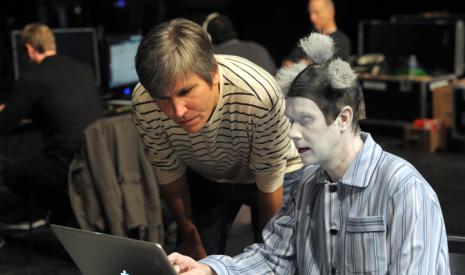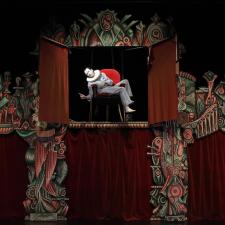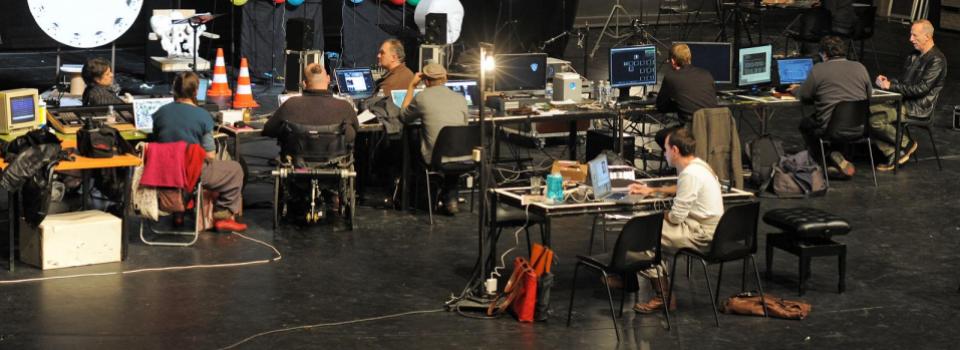
Richard III – Loyaulté me lie # 11
Who is the director of the show? Our answer to this frequently asked question: ‘no one’ is. The theatre director, this tutelary figure of the stage, at times a dictator and at times a democrat, always absolutely solitary, is still often considered a model. This head of state without a land, this sculptor of voices and bodies - which after all, aren’t made of marble – still presides over the vast majority of theatre shows. Isn’t the function of the theatre director deliciously anachronistic nowadays, a bit like a lamplighter in the times of electricity? This is 2015: theatre as an art form has changed, it has become more complex; to make a show, a team requires a palette of skills that combines really different areas of expertise. More importantly, the union of several different perspectives on one same project is what expands and improves artistic creation while making it unique. Gérald Garutti, Lorenzo Malaguerra and Jean Lambert-wild all have different qualities: the first one knows the play inside out – he is our translator, and he once ‘directed’ it – the second one likes to superimpose actors to their characters and the third one presents an acrobatic clown with an enraged performative power.
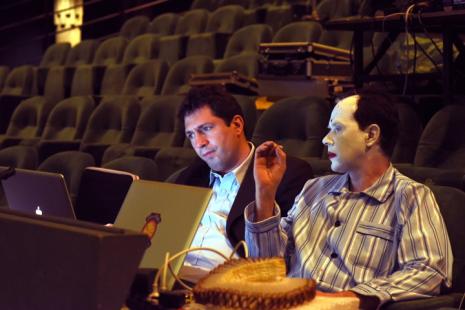
Our work on Richard III – Loyaulté me lie started in a Swiss mental health hospital which acted as a small annexe of Théâtre du Crochetan. We are now developing the piece at Théâtre de l’Union, in Limoges. Several locations and several phases of rehearsal, which reflect the way we share the practical aspects of the work, with each one of us taking the lead at different times, in the area of expertise each knows best. If we are capable of joining forces rather than entrusting one person with all the responsibilities, we will be the best at what we do. Élodie Bordas, Stéphane Blanquet, Gérald Garutti, Jean Lambert-wild, Lorenzo Malaguerra and Jean-Luc Therminarias believe that they are at their best as a six rather than on their own. Who, among these six people, is the director? Is it the actress, the actor, the scenographer, the illustrator, the musician, the translator, those who watch? The answer is: no one. The show is born of each one of our perspectives on Shakespeare.
The fact that we combine our thoughts and visions doesn’t mean we are a collective. Every one of us has experienced in the past that type of a rehearsal process, where every movement was discussed, fought against, at times even voted. Artist collectives that had a blind spot: the ego. The words we use to describe our endeavour matter: to come together doesn’t mean to disappear, be frustrated or submit oneself to the group or to the one who speaks the loudest. Of course, at times, we don’t agree with each other. But we are brought together by the best solutions, the most pragmatic options, and the reality of the stage, which never lies.
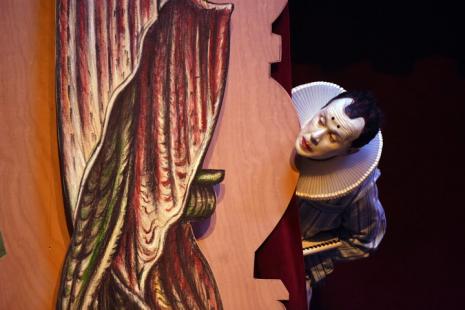
What about the creative act? It’s still here! There are moments of dazzling inspiration and when one of us suddenly livens up, it is the whole group who laughs. Let us remember the games we used to play in the playground: after all, wasn’t it always more fun to play ball games with others, rather than shoot a ball against a wall on one’s own? Let’s turn this Richard III into a childlike homage to the joy of shared laughter!
- Richard III – Loyaulté me lie # 01
- Richard III – Loyaulté me lie # 02
- Richard III – Loyaulté me lie # 03
- Richard III – Loyaulté me lie # 13
- Carnet de bord # 16 Richard III – Loyaulté me lie
- Carnet de bord # 17 Richard III – Loyaulté me lie
- Carnet de bord # 18 Richard III – Loyaulté me lie
- Carnet de bord # 19 Richard III – Loyaulté me lie
- Carnet de bord # 20 Richard III – Loyaulté me lie
- Carnet de bord # 21 Richard III – Loyaulté me lie
- Carnet de bord # 22 Richard III – Loyaulté me lie
- Carnet de bord # 23 Richard III – Loyaulté me lie
- Richard III – Loyaulté me lie # 04
- Richard III – Loyaulté me lie # 05
- Richard III – Loyaulté me lie # 06
- Richard III – Loyaulté me lie # 07
- Richard III – Loyaulté me lie # 08
- Richard III – Loyaulté me lie # 09
- Richard III – Loyaulté me lie # 10
- Richard III – Loyaulté me lie # 11
- Richard III – Loyaulté me lie # 12
- Richard III – Loyaulté me lie # 14
- Richard III – Loyaulté me lie # 15
- Richard III – Loyaulté me lie # 16
- Richard III – Loyaulté me lie # 17
- Richard III – Loyaulté me lie # 18
- Richard III – Loyaulté me lie # 19
- Richard III – Loyaulté me lie # 20
- Richard III – Loyaulté me lie # 21
- Richard III – Loyaulté me lie # 22
- Richard III – Loyaulté me lie # 23
- Richard III – Loyaulté me lie # 24

